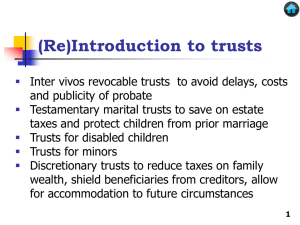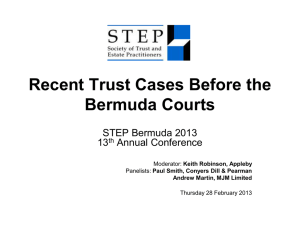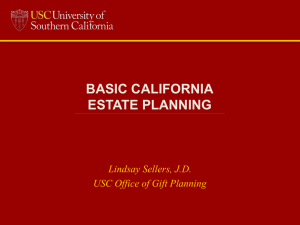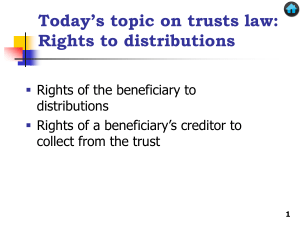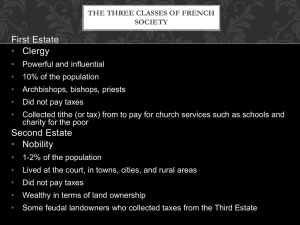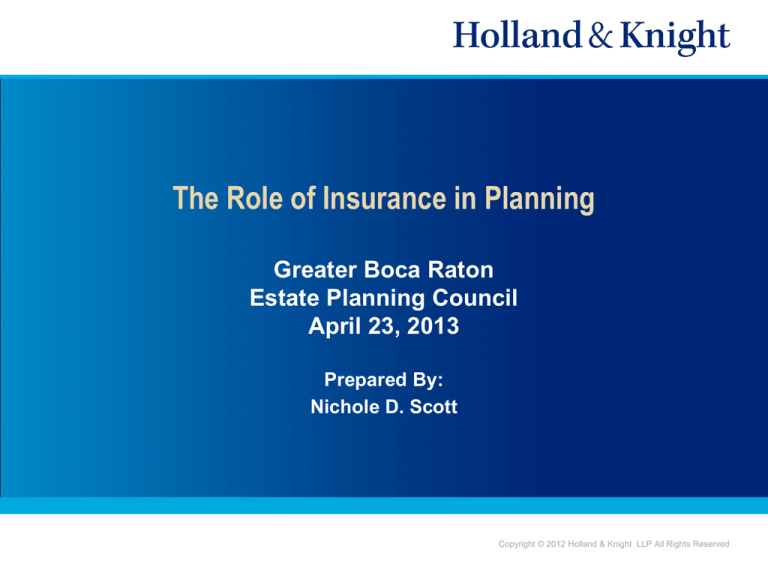
The Role of Insurance in Planning
Greater Boca Raton
Estate Planning Council
April 23, 2013
Prepared By:
Nichole D. Scott
Copyright © 2012 Holland & Knight LLP All Rights Reserved
Uses and Purposes of Insurance in Planning
• Estate Planning
– Liquidity to pay estate taxes and administration expenses
– Irrevocable Life Insurance Trusts (ILITs)
– Can be held for benefit of surviving spouse and protected from spouse’s creditors
2
Uses and Purposes of Insurance in Planning
• Asset Protection Planning
– Insurance proceeds on the life of a Florida resident are generally exempt from the
claims of the insured’s creditors (if payable to someone other than the insured or
the insured’s estate) (See Section 222.13, Florida Statutes)
– Cash surrender value of policies on citizens or residents of Florida generally not
subject to attachment, garnishment or legal process in favor of any creditor (See
Section 222.14, Florida Statutes)
3
Uses and Purposes of Insurance in Planning
• Business Succession
– Fund Buy-Sell Agreements
– Key Person Insurance
• To protect a closely held business from the loss of a key employee
• Business is the owner and beneficiary of the policy
4
Estate Tax Consequences of Life Insurance –
Section 2042
• A decedent’s gross estate includes:
– Any amount receivable by the personal representative under an insurance policy on
the decedent’s life; and
– Any amount receivable by any beneficiary under an insurance policy on the
decedent’s life to the extent the decedent possessed any “incidents of ownership”
at his death
• Incidents of Ownership include:
–
–
–
–
Power to change the beneficiary
Power to surrender or cancel the policy
Power to transfer the policy
Power to pledge the policy for a loan
5
Irrevocable Life Insurance Trusts: Benefits
• Insurance proceeds excludable from insured’s estate
• Provides liquidity for the estate: “Cash is King”
• Provides income/principal for spouse and children
• Leverages generation-skipping transfer tax exemption
• Provides protection from potential creditors
6
Irrevocable Life Insurance Trusts: Acquiring Policies
• A life insurance policy can be transferred to an ILIT either as a gift or a
sale; OR
• A life insurance policy can be purchased by an ILIT after the ILIT is
funded either through contributions or loans
• Caution: If a donor transfers, as a gift, an existing policy on his or her
life to an ILIT and dies within 3 years of the transfer, the policy
proceeds are brought back into his or her gross estate (See Sections
2035 and 2042)
• However, inclusion does not apply if the transfer within 3 years is a
bona fide sale for full and adequate consideration in money or money’s
worth (See Section 2035(d))
7
Irrevocable Life Insurance Trusts: Paying Premiums
• Annual Exclusion Gifts
• $14,000 annual exclusion per donee for 2013
• Trust beneficiaries must have present withdrawal rights (“Crummey rights”)
• 5 trust beneficiaries = $70,000 premium payment
• Utilizing lifetime gift tax exemption with an ILIT
– $5,250,000 lifetime gift tax exemption in 2013 (indexed for inflation)
– Gift assets to the ILIT so that it can pay premiums due on life insurance
8
Irrevocable Life Insurance Trusts: Paying Premiums
• Sell income-producing assets to ILIT
• Create LP with assets that produce income and sell LP interest to ILIT at a discount
• Reduce gross estate by value of discount on assets sold to ILIT
• Pay insurance premiums with income earned by LP
• Premium Financing
• Arbitrage current low interest borrowing environment against higher earning
opportunities
• Issues: collateral and exit strategy
9
Example: No Planning
• Client dies in 2013
• Gross Estate: $10,250,000
• Estate Tax Exemption: $5,250,000 (assuming no DSUE)
• Estate tax rate: 40% (flat)
• Estate tax liability: $2,000,000
• Net assets to descendants: $8,250,000
10
Example: Sell Income-Producing Assets to ILIT
Step 1: Create and fund NewCo GP, LLC and NewCo, LP with income-producing assets
CLIENT
$50,505
(100% membership interest)
NEWCO GP, LLC
$50,505
(1% GP interest)
$5,000,000
(99% LP interest)
NEWCO, LP
11
Example: Sell Income-Producing Assets to ILIT
Step 2: Sell 99% LP interest to ILIT for Promissory Note
CLIENT
99% LP interest in NewCo, LP
($3,250,000 assuming 35% total valuation discount)
Promissory Note
($3,250,000 face value)
ILIT
12
Example: Sell Income-Producing Assets to ILIT
Ownership Structure After Sale
CLIENT
ILIT
100% membership interest
NEWCO GP, LLC
1% GP interest
99% LP interest
NEWCO, LP
13
Example: Sell Income-Producing Assets to ILIT
Assets and Liabilities After Sale
ILIT
CLIENT
Promissory Note
NewCo GP, LLC
Other Assets*
Gross Estate
$3,250,000
$50,505
$5,199,495
$8,500,000
99% NewCo, LP
Note Payable
Life Insurance
$5,000,000
($3,250,000)
Substantial coverage**
* Original total assets ($10,250,000) less assets transferred to NewCo GP, LLC and NewCo, LP ($5,050,505).
** $167,500 per year available to pay premiums (see next slide).
14
Example: Sell Income-Producing Assets to ILIT
• Annual interest payments from ILIT to Client: $32,500
– Assuming 9 yr. note at May 2013 mid-term AFR of 1%
• Annual trust income: $200,000
– Assuming NewCo, LP earns 4% per year on its assets
• $167,500 available to pay insurance premiums ($200,000 less $32,500)
– Substantial insurance coverage can be purchased with $167,500 per year
– Any amount not used for premiums can be distributed to ILIT beneficiaries if desired
– Premium financing alternative: ILIT borrows money from bank at low interest rate to
pay premiums and invests the $167,500 for potential higher earning opportunities
• Estate tax liability: $1,300,000 (40% x ($8,500,000 - $5,250,000))
– Estate tax savings of $700,000 compared to no planning where estate tax liability
was $2,000,000
15
Fixing a Broken Insurance Trust
• Sell policy from old ILIT to new ILIT
• Modify the ILIT
• Decant to a new ILIT
16
Sell Policy from old ILIT to new ILIT
• Allows a grantor to change the terms of the ILIT, such as
allocating generation-skipping transfer tax exemption to the
new ILIT or changing beneficiaries
• Structuring the Transaction
– Grantor gifts or loans money (seed money) to new ILIT so that the
new ILIT can purchase the policy from the old ILIT
– Note: Beneficiaries of old ILIT will be “capped” at purchase price
– Beware of the transfer for value rule
17
Transfer for Value Rule – Section 101(a)
• General Rule – Life insurance proceeds are not includable in gross
income
• Exception – Proceeds are includable if the policy has been transferred
for valuable consideration (reduced by consideration and premiums
paid)
• The exception does not apply, i.e., there is no transfer for value if:
– The transferee’s basis is the same as or determined in part by the transferor’s basis
(exception for gifts); or
– The transfer is to:
• The insured
• A partner of the insured
• A partnership in which the insured is a partner
18
Sell Policy from old ILIT to new ILIT
• If the old ILIT and the new ILIT are grantor trusts:
– Transfer between the two grantor trusts is disregarded for income
tax purposes
– The transfer is not considered a transfer for valuable consideration
under Section 101(a)(2) of the IRC so there should be no income
tax consequences upon the death of the grantor (See Rev. Rul.
2007-13)
19
Sell Policy from old ILIT to new ILIT
• If the new ILIT is not a grantor trust:
– Any gain in the policy will be subject to income taxes on
the transfer in the hands of the old ILIT
– Transfer for valuable consideration present, but transfer is
exempt because the transfer to the new ILIT is treated as
a transfer to the grantor/insured so no income tax
consequences on the death of the grantor (policy
proceeds still exempt from tax) (Section 101(a)(2)(B) of
the IRC)
20
Grantor Trust Status – Section 677(a)(3)
• A trust is a grantor trust if the income without the approval or consent
of any adverse party is or in the discretion of the grantor or a
nonadverse party, or both, may be –
– Applied to the payment of premiums on policies of insurance on the life of the
grantor or the grantor’s spouse
• Most ILITs are grantor trusts
• To not be a grantor trust, trust would have to prohibit the use of income
for the payment of premiums (and not have any other grantor trust
provisions)
21
Consolidation/Simplification of Estate Plan
• Client Example
– Get liquid assets into a trust that can benefit beneficiaries now (typically non-GST
exempt assets)
– Move insurance policies into longer term, GST exempt trust to provide greater tax
benefits for client
22
Judicial Modification: Not Inconsistent with Settlor’s Purpose
• Upon application of a trustee or any qualified beneficiary,
a court may modify the terms of an irrevocable trust if
– The purposes of the trust have been fulfilled or have become
illegal, impossible, wasteful or impracticable to fulfill,
– Because of circumstances not anticipated by the settlor,
compliance with the terms of the trust would defeat or
substantially impair the accomplishment of a material purpose
of the trust, or
– A material purpose of the trust no longer exists
(Section 736.04113 of the Florida Statutes)
23
Judicial Modification: Not Inconsistent with Settlor’s Purpose
• In modifying the trust the court may
– Amend or change the terms of the trust, including the terms
governing distribution of the trust income or principal or terms
governing administration
– Terminate the trust in whole or in part
– Direct or permit the trustee to do acts that are not authorized or
that are prohibited by the terms of the trust
– Prohibit the trustee from performing acts that are permitted or
required by the terms of the trust
24
Judicial Modification: Not Inconsistent with Settlor’s Purpose
• In exercising its discretion
– The court shall consider
• the terms and purposes of the trust
• the facts and circumstances surrounding the creation of the
trust
• the extrinsic evidence relevant to the proposed modification
• any spendthrift provision, however the court is not
precluded from modifying the trust because of a spendthrift
provision
25
Judicial Modification: Best Interests
• If compliance with the terms of a trust is not in the best interests of
the beneficiaries, upon application of a trustee or any qualified
beneficiary, a court may modify an irrevocable trust to
– Amend or change the terms of the trust, including the terms governing
distribution of the trust income or principal or terms governing
administration
– Terminate the trust in whole or in part
– Direct or permit the trustee to do acts that are not authorized or that
are prohibited by the terms of the trust
– Prohibit the trustee from performing acts that are permitted or required
by the terms of the trust
(Section 736.04115 of the Florida Statutes)
26
Judicial Modification: Best Interests
• Court shall exercise its discretion in a manner that
– conforms to the extent possible with the intent of the settlor
– takes into account the current circumstances and best interests
of the beneficiaries
27
Judicial Modification: Best Interests
• In exercising its discretion
– The court shall consider
• the terms and purposes of the trust
• the facts and circumstances surrounding the creation of the
trust
• the extrinsic evidence relevant to the proposed modification
• any spendthrift provision, however the court is not
precluded from modifying the trust because of a spendthrift
provision
– Note: same considerations as judicial modification when not
inconsistent with settlor’s purpose
28
Judicial Modification: Best Interests
• Section 736.04115 does not apply to
– trusts created prior to January 1, 2001, and
– trusts created after December 31, 2000 if
• under the terms of the trust, all beneficial interests must
vest or terminate within the “old” RAP period (i.e., a life in
being, plus 21 years or 90 years after creation)
• the terms of the trust expressly prohibit judicial modification
• Modification under Section 736.04113 (not inconsistent
with Settlor’s purpose) not subject to above restrictions
29
Nonjudicial Modification
• After the settlor’s death, a trust may be modified upon
the unanimous agreement of the trustee and all qualified
beneficiaries to
– Amend or change the terms of the trust, including the terms
governing distribution of the trust income or principal or terms
governing administration
– Terminate the trust in whole or in part
– Direct or permit the trustee to do acts that are not authorized or
that are prohibited by the terms of the trust
– Prohibit the trustee from performing acts that are permitted or
required by the terms of the trust
(Section 736.0412 of the Florida Statutes)
30
Nonjudicial Modification
• Agreement to modify is binding on a beneficiary whose interest is
represented by another person
31
Nonjudicial Modification
• Section 736.0412 does not apply to
– trusts created prior to January 1, 2001
– trusts created after December 31, 2000 if
• All beneficial interests must vest or terminate within the
“old” RAP period (i.e., a life in being, plus 21 years or 90
years after creation) unless the terms expressly authorize
nonjudicial modification
– trusts for which a charitable deduction is allowed or allowable
until the termination of all charitable interests in the trust
32
Common Law Modification and Termination
• Judicial Modification
• Judicial Termination
• Nonjudicial Modification
• Nonjudicial Termination
(See summary chart attached)
33
Decanting
• Absent a contrary direction in the trust, a trustee who has absolute
discretion to invade the principal of a trust may appoint all or part of
the principal of the trust in favor of a trustee of another trust
provided
– Beneficiaries of second trust may include only beneficiaries of first
trust;
– Second trust may not reduce any fixed income, annuity or unitrust
interest in the assets of the first trust; AND
– If any contribution to the first trust qualified for the marital or charitable
deduction, the second trust shall not contain any provision which
would have prevented the first trust from qualifying for the deduction
or would have reduced the deduction
(Section 736.04117 of the Florida Statutes)
34
Decanting
• Absolute discretion to invade the principal =
– Power to invade principal not limited to specific or ascertainable
purposes, such as health, education, maintenance and support
– Not required to use term “absolute”
– Power to invade principal for purposes such as best interests,
welfare, comfort or happiness is an absolute power not limited
to specific or ascertainable purposes
35
Decanting
• Exercise of power requires an instrument in writing, signed and
acknowledged by the trustee and filed with the records of the first trust
• Shall be considered the exercise of a power of appointment, other than
a GPOA held by the trustee
• Shall be subject to RAP period
• If trust GST tax exempt, must consider possible GST tax implications of
decanting
36
Decanting
• Trustee must notify all qualified beneficiaries of first trust, in writing, at
least 60 days prior to effective date of exercise of power
• Copy of instrument exercising the power satisfies notice obligation
• If all qualified beneficiaries waive notice period, trustee’s power
exercisable immediately
• Trustee’s notice shall not limit beneficiary’s right to object to exercise of
power as otherwise permitted
37
Decanting
• Exercise of power not prohibited by a spendthrift clause or by a
provision that prohibits amendment or revocation of trust
• Trustee has no duty to exercise power to invade
• Does not abridge right of any trustee who has power of appointment
under terms of trust or Florida law
• Compare with power to decant under Delaware law (Del. Code, Title
12, Section 3528)
38
Thank You!
Presented By:
Nichole D. Scott
Holland & Knight LLP
701 Brickell Avenue, Suite 3000
Miami, Florida 33131
(305) 789-7566
nichole.scott@hklaw.com
#22962391
39


